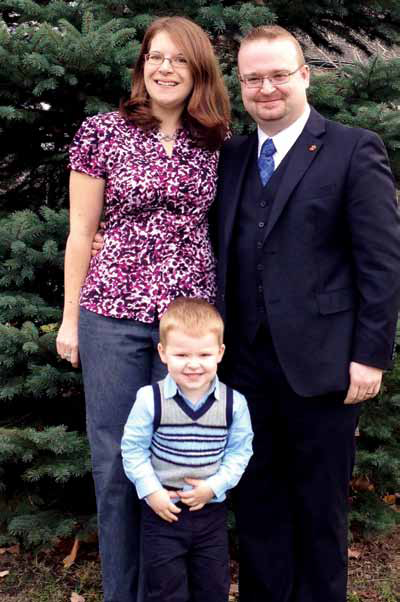 Stephen Blais knows he came within an inch of death, meaning he would have left behind his young son to live the vast majority of his life without a dad.
Stephen Blais knows he came within an inch of death, meaning he would have left behind his young son to live the vast majority of his life without a dad.
Having gone to the edge of the cliff and come back, the city councillor has a renewed commitment to healthy living and helping others avoid what he and his family went through.
Early in the new year, the first-term Ottawa councillor, who represents the east-end ward of Cumberland, was already taking steps to improve his health with regular exercise when he suffered a heart attack while working out with a trainer at a gym.
The 32-year-old was in an induced coma for two days immediately after and also caught a severe bout of pneumonia.
Ottawa Parenting Times Magazine conducted an email interview with Blais in the spring, as he was still undergoing rehabilitation at the Ottawa Hospital’s General campus (he has since returned home and as of this writing, there was no set date for his return to work).
He talked about what he said would be a heightened focus on what he calls the “four pillars of healthy living” — exercise, proper eating, sufficient rest and regular medical checkups — in an effort to prevent this from happening again.
“When I now think of my wife and son nearly losing me, this is the only motivation I need to eliminate any and all excuses that I, like many others, make about our health,” Blais says.
Besides that, Blais says he will use the publicity that comes with being a politician to make others aware of the importance of maintaining their health.
“I will use my status as an elected official and help in any way I can to promote healthy living in hopes of saving any family from dealing with what mine had to go through,” he says.
Blais’ immediate family consists of his wife Marta and three-year-old son, Stephen Jr. After the heart attack, Blais went more than a month without seeing his son.
“This was by far the longest time we spent apart as I always made time for him,” Blais says. “It has been frustrating and heart-breaking, not being present for my son.”
Stephen Jr. was spared the full account of how close he came to losing his father.
“My wife and family simply told him that Daddy was sick, but he is getting better because of the fine doctors and nurses in the hospital,” Blais says.
When Stephen Jr. finally did come to visit him in the hospital, Blais says he was “relieved” the young boy was not frightened by the sight of his dad, bed-ridden with tubes attached to him.
Before the heart attack, Blais had taken some initiative to exercise to offset some weight gain. Still, he attributes the heart attack more to genetics than lifestyle.
“To be honest, while there are heart problems on both sides of my family … like most people, until this happened to me, I never thought much of it,” he says. “But let me be clear, the arterial plaque buildup was not the result of poor lifestyle choices or a busy schedule.”
That said, Blais — who has been pursuing an MBA at Carleton University’s Sprott School of Business on top of his municipal and family duties — says he will now “stop and smell the roses more often as life is truly precious.”
He also appreciates how fragile life can be. “I’ve been told by the doctors and nurses that there were a number of times that I could have been declared dead.”
Even at this young age, Blais says he was “diligent” about having things in order, such as a will and funeral arrangements, so that if the worst happened, his family would not be unnecessarily burdened.
Dr. Jacob Udell, a cardiologist at the Toronto General Hospital and Women’s College Hospital, says there’s no data he’s aware of that shows people with children at a higher risk for having heart problems.
However, he says certain factors that often come with being a parent, such as sleep deprivation and struggling to find time to exercise and eat properly, can create a “perfect storm” for cardiovascular problems.
“The sleep deprivation alone we know is associated with poor eating habits,” he says. “It changes the chemistry in your body in terms of you wanting to eat simple, easy-to process carbohydrates.”
As a parent with a demanding job, Udell understands how tight schedules can get in the way of finding time to exercise. He recommends looking for ways to incorporate exercise into family time.
“To even just play sports or running around, playing hideand- go-seek with the kids for 30 to 40 minutes, it’s probably more aerobic activity that most parents would otherwise be getting if they don’t have that opportunity.”
Healthy diets can be another consequence of being timeconstrained, as fast food and pop-in-the oven, processed dishes seem like convenient options. However, Udell notes that healthy food choices are not always high-maintenance ones.
Having “carrots, celery and other kinds of snacks around the house” makes it easy to fill up on nutritious things that don’t clog the arteries, and drinking water regularly also reduces the urge for salty, carb-loaded foods like potato chips, he adds.
Udell says that while it’s rare for people in their early 30s, like Blais, to suffer heart attacks, it becomes increasingly important as one reaches that stage of life to be proactive about maintaining a healthy heart.
“This is the time in life to start to deciding and building into the daily routines decisions about healthy lifestyle choices to avoid the fatal or very, very scary and potentially fatal heart attacks later in life.”
By Derek Abma
Photo: courtesy of Blais Family


